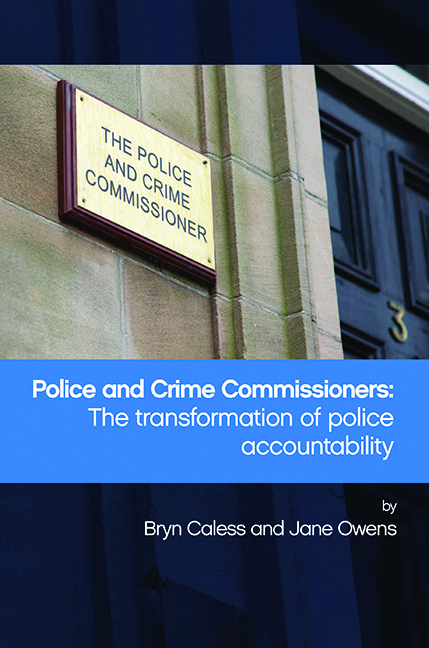Book contents
- Frontmatter
- Dedication
- Contents
- List of tables and figure
- Glossary of terms
- Acknowledgements
- Introduction
- one Governance: the Police and Crime Commissioner and police accountability in context
- two The psephology of the November 2012 election: motive, means and opportunity
- three Is the law on my side? Relationships between the PCC and the chief police officer team
- four Partners, colleagues or rivals for oversight? The (PCC) art of making friends and influencing people
- five “Putting yourself about”: PCCs, the media and the public
- six The debate with no end: PCCs’ remit and the problems of policing
- seven “I wonder if the game is worth the candle”: PCCs, their ‘work–life balance’ and their future
- General summary
- Bibliography
- Appendix Interview questionnaires
- Index
two - The psephology of the November 2012 election: motive, means and opportunity
Published online by Cambridge University Press: 01 September 2022
- Frontmatter
- Dedication
- Contents
- List of tables and figure
- Glossary of terms
- Acknowledgements
- Introduction
- one Governance: the Police and Crime Commissioner and police accountability in context
- two The psephology of the November 2012 election: motive, means and opportunity
- three Is the law on my side? Relationships between the PCC and the chief police officer team
- four Partners, colleagues or rivals for oversight? The (PCC) art of making friends and influencing people
- five “Putting yourself about”: PCCs, the media and the public
- six The debate with no end: PCCs’ remit and the problems of policing
- seven “I wonder if the game is worth the candle”: PCCs, their ‘work–life balance’ and their future
- General summary
- Bibliography
- Appendix Interview questionnaires
- Index
Summary
‘The Home Office ran the elections and did it badly because they were not experienced enough to know what to do and left all the organisation far too late, so people didn't know what was going on, and didn't really understand what the issues were. It was a typical British cock-up.’ (Interviewee 51)
The election: obstacles and hurdles
The citation from a disaffected PCC with which this chapter begins is typical of the reaction of many Police and Crime Commissioners to the events and problems that beset candidates in the run up to the PCC election in November 2012 and in its aftermath. Many were unhappy with the speed and what they saw as the ill-preparedness of the election process, begun only months before, and some independents jibbed at the idea of having to compete as amateurs against sophisticated party political machines. The same PCC commented on the general impression that matters were rushed unnecessarily, just so that political parties could “get their preferences in”, at a time of austerity in public expenditure:
‘The PCC elections were going to cost a fortune at a time of great economic danger, and it was clear that the political parties had all judged this to be an opportunity to get their preferences in this position of considerable local power. So it was about cost, but also about timing too. The coalition government should have taken longer to consider what was involved and to have planned it more carefully: there was no real reason why the election of PCCs could not have waited until May 2013, but no, they had to run it as soon as feasible.
That was part of the weakness I saw, and so that's when I decided to stand.’ (Interviewee 51)
Part of the problem about timings of the election was related to the government's wish to push through with the PCC elections because it had been a manifesto commitment, but also because a substantial period could elapse before the next general election, by which time, they hoped, the PCCs would be ‘embedded’ in local policing.
- Type
- Chapter
- Information
- Police and Crime CommissionersThe Transformation of Police Accountability, pp. 37 - 64Publisher: Bristol University PressPrint publication year: 2016

